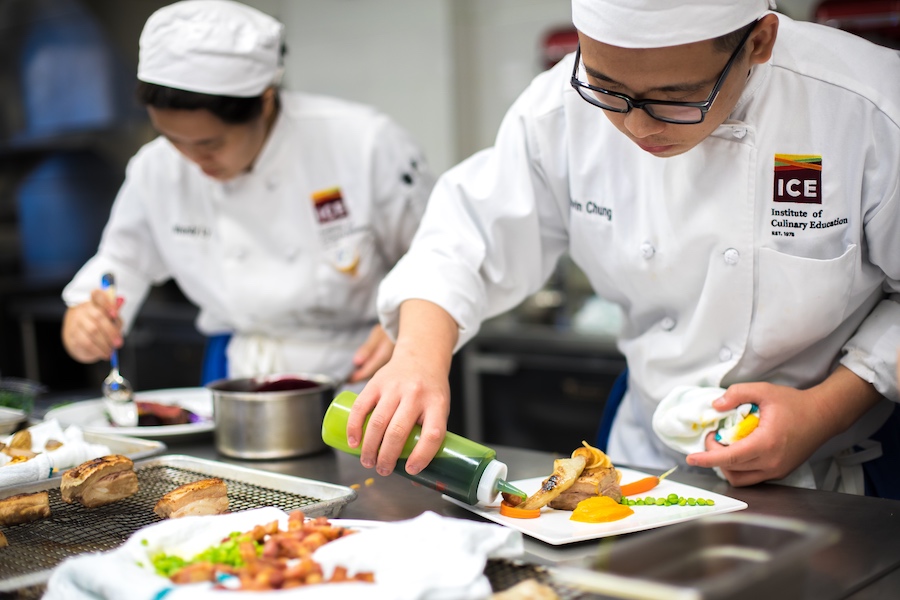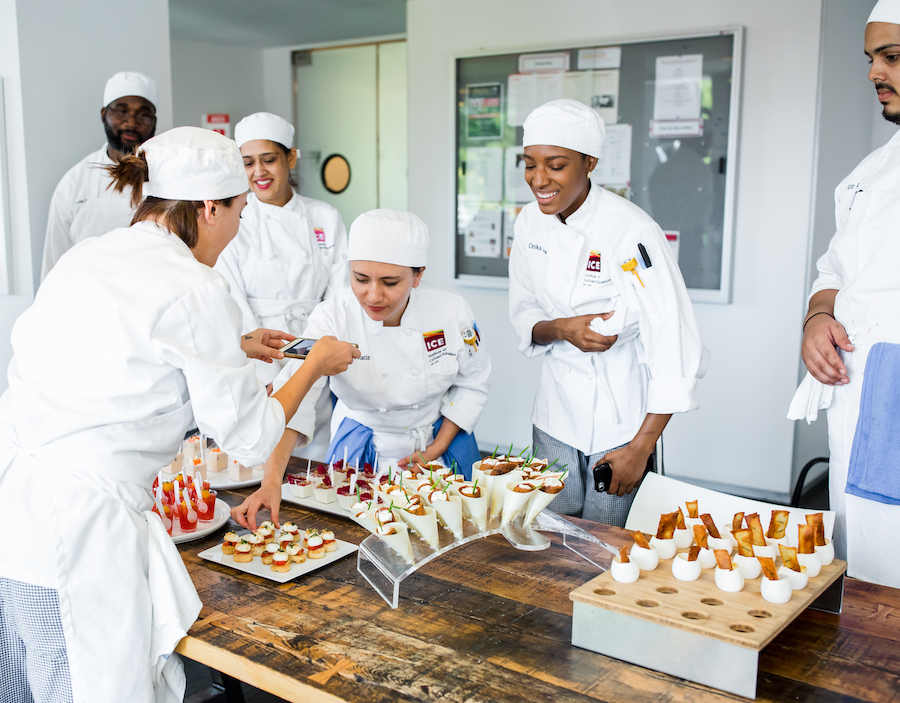So, what is culinary school anyways? ICE alum Pamela Vachon (Culinary, '11) explains what the culinary school curriculum is like and some of the skills you'll be taught in the kitchen classroom.
To answer the question, “What do you learn in culinary school?” with the obvious response — how to cook — would be an oversimplification. But simple is a good place to start when thinking about what a culinary school curriculum provides.
If you decide to attend culinary school, you’ll spend a good bit of time with salads and sauces. You’ll be tasked with both consistency and creativity. You'll focus on the fundamentals, and when you've mastered them, you'll progress to more complex skills relating to flavor and technique.
The Culinary Arts program at ICE is comprised of five modules and 110 lessons, and concludes with an externship — with an emphasis on foundational learning. That all begins with basic products and skills and moves forward from there, layering on skills just as one might layer in flavors.
 Early lessons lean into product recognition, knife skills and food safety. I definitely came to ICE with a mindset that I already had some cooking skills, but I can say from my own experience that the start-from-the-beginning method of instruction at ICE was critical to the training that happened both in and out of the classroom.
Early lessons lean into product recognition, knife skills and food safety. I definitely came to ICE with a mindset that I already had some cooking skills, but I can say from my own experience that the start-from-the-beginning method of instruction at ICE was critical to the training that happened both in and out of the classroom.
Pursue a professional culinary education with career training at ICE.
The culinary school curriculum moves on from these basics into soups and sauces, dry heat and moist heat cooking methods, as well as vegetable and egg cookery. With a solid foundation of these techniques, you will then move into flavor-based lessons that involve deep dives into various regional cuisines with an emphasis on why different parts of the world showcase different styles and products. (There’s a reason people associate butter with French cuisine and olive oil with Italian, for example.)
You will delve into pastry but fear not — if you’ve ever felt like you had no facility with pie crust, I can say from experience that having access to a large, cool, stainless steel work table helps tremendously. Toward the end of the curriculum, you will work through complex recipes developed by renowned contemporary chefs, and finally, you’ll be invited to showcase your own creativity during several “Market Basket Challenge” lessons.
Every day you will be using techniques developed in the earlier courses: fabricating proteins into usable portions, dicing vegetables and making sauces to accompany various dishes. You will never stop dicing vegetables; it feels like every cuisine on earth has a version of mirepoix, a base of vegetables used in sauces and dishes.
"Cooking at its core is about adaptation. You may have an idea of the end result in your mind yet between a cold pan and a beautifully plated dish are numerous complex variables that will put your skills to the test," says VP of Culinary Operations, Barry Tonkinson. "That is why it is important to go to culinary school to learn the whys of cooking. In the field, you will be told how to cook something, but no one will explain why you are doing it. Once you understand the science, you can adapt recipes and develop the ability to create, the chef's ultimate goal."
You will notice that a proper sauté is a proper sauté, whether you are cooking classical French, contemporary American or neo-space-age Icelandic cuisine. What kind of pan to use, how much the type and amount of cooking fat, how high the heat should be, how to place the protein, what to look and listen for all become important. You will have recipes to work from, but it will no longer be enough to rely on stated cooking times and hope for the best; you must learn how to become intuitive and use all of your senses — listening to a sizzle, smelling an aroma, watching for the Maillard reaction and touching for doneness, tasting and adjusting over and over — rather than just the instructions and the timer, to determine whether or not something is done.
 "At culinary school, you will learn why things happen and how to do them," Chef Barry says. "However, mastering any skill takes repetition, time and practice. A tourné is never mastered after the first lesson, even after the first week or month. It is a muscle memory that exists only when your knife has become an extension of you, when you are comfortable and confident and when your mind doesn't have to tell your hand what to do. Practice, read, eat, study and explore to grow as a cook, to improve on the fundamentals that will set the foundation for your future."
"At culinary school, you will learn why things happen and how to do them," Chef Barry says. "However, mastering any skill takes repetition, time and practice. A tourné is never mastered after the first lesson, even after the first week or month. It is a muscle memory that exists only when your knife has become an extension of you, when you are comfortable and confident and when your mind doesn't have to tell your hand what to do. Practice, read, eat, study and explore to grow as a cook, to improve on the fundamentals that will set the foundation for your future."
On day one of my culinary education when binders for the first several courses of our curriculum were getting passed around, I did what I’d normally do in any other kind of school: I flipped to the end of the syllabus to see what we would be tested on. I did this, I humbly admit, with an overachiever’s spirit. With visions of exquisite foams and reductions dancing in my head, I wanted to daydream about the dazzling dishes we’d be presenting, and the heights to which I’d soar given my weeks (weeks!) of culinary school training. My expectations were quickly managed when I learned that after the first few lessons our first exam would be providing our chef-instructor with a cream of broccoli soup, a cup of hand-whisked mayonnaise and two potatoes, medium diced.
While at the time this seemed simplistic to me, over time it became clear that this is culinary school’s first, last and most important lesson if you will allow yourself to learn it: Humble yourself. Much like building a complex, flavorful sauce, learning how to cook is a process of layering skills. You need to master the earlier ones before you can move on. There are skills you may think you have, but that might include some bad habits unless you are willing to unlearn them and start again at the beginning to rebuild better ones. We’re not getting much beyond mayonnaise and mirepoix in the first few weeks because there are skills there that need to be done consistently and correctly, which take more than just 10 minutes of practice.
So, what do you learn in culinary school? Culinary school will teach you not only the foundational methods of cooking but also life lessons including discipline to organization, problem-solving and time management.
Learn more about the new Online Culinary Arts & Food Operations Program here.






